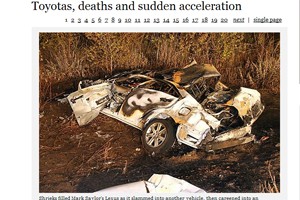The Los Angeles Times did a masterful job of digging through court filings and police reports to document 56 deaths related to uncontrolled acceleration in Toyotas. That’s 22 more deaths than the 34 listed in National Highway Traffic Safety Administration complaints.
Some of those deaths occurred in models not subject to recall. A Toyota spokesman declined to comment for the story, which continues: “The company has said it is confident that all models with potentially sticking pedals have been identified and that the recalls will address all problems.”
The lede is chilling: “One car barreled through a stop sign, struck a tree and landed upside down in a Texas lake, drowning four people. Another tore across an Indiana street and crashed into a jewelry store. A third raced at an estimated 100 mph on a San Bernardino County street before striking a telephone pole, killing a restaurant owner.”
The story, by Stuart Pfeifer, Carol J. Williams and Robert Faturechi, also describes cases where drivers were blamed for accidents before the problem with acceleration in Toyotas was widely known. In one case, the driver was charged with “gross vehicular manslaughter” and faces up to six years in prison, the story says.
Use Pacer, Factiva and other databases for data on national trends.
If your media outlet doesn’t offer access to these proprietary databases, sometimes your local public or college library will help.
Stuart says the trio spent fewer than three weeks pulling together the data. Many people told the reporters of people they knew who’d been hurt or killed in accelerator accidents.
But to confirm the data, Stuart says they used Pacer to search courts across the country for lawsuits against Toyota. They used Factiva
and other news databases to search for accidents involving sudden acceleration. But the bulk of their time was spent confirming information with local police departments because even the NHTSA data didn’t provide specifics. The reporters provide details on the 56 deaths in a separate list.
“In one of the cases, I ended up having a hard time getting the police report, so I called the medical examiner to confirm someone’s identity,” says Stuart, who covered courts and crime for 20 years.









